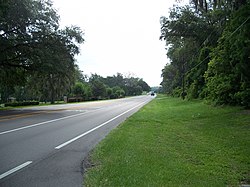Saint Leo, Florida
| St. Leo | |
|---|---|
| Town | |

Eastbound SR 52 in St. Leo
|
|
 Location in Pasco County and the state of Florida |
|
| Coordinates: 28°20′17″N 82°15′12″W / 28.33806°N 82.25333°WCoordinates: 28°20′17″N 82°15′12″W / 28.33806°N 82.25333°W | |
| Country | United States |
| State | Florida |
| County | Pasco |
| Government | |
| • Type | Town Commission |
| • Mayor | Richard Christmas |
| Area | |
| • Total | 1.9 sq mi (4.9 km2) |
| • Land | 1.6 sq mi (4.2 km2) |
| • Water | 0.3 sq mi (0.7 km2) |
| Elevation | 187 ft (57 m) |
| Population (2010) | |
| • Total | 1,340 |
| • Density | 837.5/sq mi (319.0/km2) |
| Time zone | Eastern (EST) (UTC-5) |
| • Summer (DST) | EDT (UTC-4) |
| FIPS code | 12-62775 |
| GNIS feature ID | 0290265 |
| Website | http://www.townofstleo-fl.gov |
St. Leo is a town in Pasco County, Florida, United States. It is a suburb included in the Tampa-St. Petersburg-Clearwater, Florida Metropolitan Statistical Area. The population was 1,340 at the 2010 census. It is best known as the home of Saint Leo University, Holy Name Monastery and Saint Leo Abbey. Richard Christmas currently serves as the commission-elected mayor of the town.
In 1889 the Benedictines established the monastery of St. Leo and St. Leo College on Judge Edmund F. Dunne's former homestead and farm land east of San Antonio, Florida on the shores of Lake Jovita, later incorporating the area as part of a new town called St. Leo.
Dunne was a legal counsel involved in the Disston Land Purchase of 1881, and as his commission, received 100,000 choice acres (400 km2) of land out of the 4,000,000 acre (16,000 km²) purchase. The following year on February 15, while surveying the Disston Purchase with his cousin, Captain Hugh Dunne, Dunne selected the area around Lake Jovita as his commission and began settling it. He first established Catholic colony of San Antonio in 1882, and later added the surrounding villages of Saint Joseph, Saint Thomas, Villa Maria, Carmel and San Felipe. Only the rural community of Saint Joseph survives today. The area of what is now the Town of St. Leo, although originally platted as another village by Dunne, did not receive its name until after the arrival of the Benedictine monks. The present name is derived from Pope Leo IX.
...
Wikipedia
